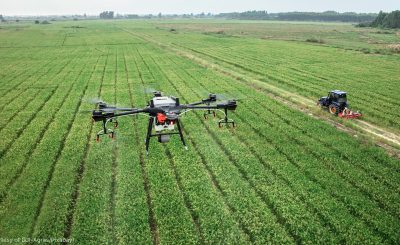Views: 32
How To Start An Agriculture Business From Scratch In Nigeria

Farming and agriculture business are very important in Nigeria because most people rely on them to make a living. With Nigeria’s population growing fast, the demand for food and other farm products keeps increasing. That’s why many people are now going into agribusiness—it has a big market and can bring in a lot of profit.
One great thing about agribusiness is that you can combine different farm activities without spending too much which help you save money and earn more.
Because of these benefits, more people are interested in joining the agribusiness industry. If you’re thinking about starting your own agriculture business, you’re in the right place. In this article we’ll guide you on how to start an agricultural business from scratch.
Easy Steps On How to Start an Agriculture Business from Scratch In Nigeria
If you want to start a farming business, you need to plan well and take the right steps. It’s not something you jump into without preparation. Below are some simple steps to help you on how to start an agricultural business from scratch in Nigeria.
- Develop Your Business Idea
Like any other business, before you start an agricultural business, the first thing to do is come up with a good idea. This idea will be the base of your business, so it’s important to take it seriously. To do this, you should focus on two main things: knowing what you enjoy and what you’re good at, and doing some research to understand the market.
It’s easier to run a business when it’s something you enjoy. Think about your hobbies, talents, and past experiences. These can help you find out what kind of agricultural business fits you best.
Also, think about what you already know. If you have skills or experience in a certain area in agriculture business, it will give you a better chance of doing well especially when starting from scratch. People will also trust you more if they see you understand what you’re doing. When your business matches your passion and skills, you’re more likely to stay motivated and succeed.
- Conduct a Competitive Analysis
To grow a strong business, you need to understand who else is in the market. This means doing a simple competitive analysis. It helps you learn more about your industry, spot your competitors, and figure out what makes your business different from theirs.
Start by looking for similar agricultural businesses as the one you want to venture in,
Your competitors can be grouped into:
- Direct competitors sell the same things to the same type of customers as you.
- Indirect competitors sell similar things but may serve different customers or use a different business style.
You can find competitors by:
- Searching online using keywords related to your business.
- Visiting local businesses and seeing what they offer.
- Asking people (through surveys) where they shop or who they buy from.
Once you know who your competitors are, think about what makes your agriculture business better or different.
Here’s what to look at:
Your place in the market: Are you focusing on a certain group of people or a specific area? This can help you stand out.
Your strengths and weaknesses: Think about what you do well (like customer service or product knowledge) and what you need to improve.
Your unique offer: What special thing do you provide? Maybe your product is better quality, cheaper, or gives a better experience.
- Business Plan
If you want your agriculture business to grow and succeed in Nigeria, it’s very important to create a business plan. A business plan is like a roadmap—it helps you stay on track and also shows others where your business is headed. It turns your ideas into a clear plan that others can understand and support.
When writing your business plan, include everything you’ve learned from your market research. This includes details about your target customers, your competitors, and what makes your business special. The plan should show how your agriculture business will work, what your goals are, and how you plan to reach those goals.
A good business plan doesn’t need to be complicated. It should simply explain:
- What you plan to sell or offer
- What makes your business different
- What your business is about
- What resources you’ll need to get started
- Your short- and long-term goals
- Who your customers will be
- How you will make money
By putting all these details together, your business plan becomes a tool you can use to guide your decisions and attract support from investors, partners, or even friends and family.
- Getting Financial Aid
One big challenge many new farmers face is finding the money to start their farm. Without enough funds, it can be hard to buy land, equipment, seeds, or even hire workers. That’s why it’s very important to explore different ways to get financial support. Here are a few good options you can look into.
- Loans
Another popular way to finance your small farm is by taking a loan. Loans are faster to get compared to grants and can help you start operations quickly. But not all farms qualify for loans. For example, if you just want to farm as a hobby, banks or lenders may not want to take the risk.
However, if you have a good business plan and you’re running your farm as a serious business, your chances of getting a loan are much higher. Your plan should clearly show how your farm will make money, how you plan to grow, and how you will pay back the loan. This will give lenders confidence that you’re serious and capable.
- Grants
While most governments don’t give out free money (grants) just to start a small farm, there are still some helpful programs you can benefit from. These include subsidies and other forms of support like training, equipment discounts, or access to farming tools.
To find out what’s available in your area, visit or contact your local department or ministry of agriculture. They can give you useful information about support programs that are meant to help small farmers like you. Even if you don’t qualify for a grant, you might still receive help that reduces your starting costs.
- Getting a License
Before you start your agricultural business it’s important to make sure you have the right licenses. This helps you avoid problems with the law and run your farm smoothly.
You also need to learn about the rules in your area. Some places have zoning laws that limit what kind of farming you can do. For example, in Nigeria, you might not be allowed to raise cows and certain animals or grow certain crops in some locations. In some cases, these restrictions can also make getting a license more expensive or require extra inspections.
To avoid surprises, talk to your local state department of agriculture. They can give you up-to-date information on zoning rules and tell you what licenses or permits you need for your farm. This will help you stay within the law and avoid any unnecessary costs.
- Find the Right Land
After deciding what you want to farm and learning the basics of starting, the next big step is getting the right land. Without good land, your farming business can’t begin. There are two main ways to get land: you can either buy it or lease it.
Buying land means you own it fully, and you can use it however you want. But for first-time farmers, buying land is not always the best idea. It costs a lot of money, and there’s a big financial risk if the business doesn’t go as planned.
On the other hand leasing land is a better option for new or young farmers. It’s cheaper and comes with less financial risk. You don’t need a lot of money to start, and you can focus more on farming instead of paying off land. The main thing is to find landowners who have good land they’re willing to rent out.
What to Look for When Choosing Land
Whether you’re buying or leasing, don’t just pick any land. You need to check a few important things before making a decision:
- Distance to the Market and Easy Access
Choose land that’s close to where you will sell your products. Land that’s too far from the market can cause transport problems and increase your costs. Since you already did your market research, use that knowledge to pick a good location. Also, make sure the land is easy to reach by road. This makes it easier to transport your goods and bring in supplies.
- Water Supply
You must choose land that has a reliable source of water. Water is needed for your crops, animals, and other farm activities.
– Due to the unstable power supply in Nigeria, a well is a good option because it gives free water, but you must check if the water is clean.
- Soil Quality
Good soil is very important for growing healthy crops and raising animals. Bad soil can increase your costs and lower your harvest.
You should test the soil before using it. Local agricultural extension offices can help with this. The soil test will tell you what nutrients are in the soil and what kind of fertilizer you may need. It also helps you understand which crops or animals will do well on that land.
- Market Your Products
After setting up your small farm and learning how everything works, the final and most important step is selling your products. If you’re farming to make money, then your success depends on how well you can sell what you produce. There are many simple and effective ways to do this.
- Sell Under One Brand
You can also work together with other small farmers in your area. By selling under one name or brand, you can build trust and make it easier for people to recognize your products.
- Farmers Markets
Selling at local farmers markets is one of the easiest and most common ways. You harvest your crops or prepare your products, then set up a small stand at the market to sell directly to customers.
- Use E-commerce
Ecommerce platforms like Komback, jiji, Julia, are powerful tool for selling farm products online in Nigeria. These tools help you display your products, take orders, and collect payments with ease.
What Are the Most Profitable Types of Farming?
If you’re thinking about starting a farm to make money, it’s good to know that some types of farming can be more profitable than others. The amount of profit you can make depends on things like your location, what people want to buy, how big your farm is, and how well you manage it.
Here are some farming ideas that are known to bring in good income:
- Fish Farming
Raising fish like tilapia, catfish, or trout can bring in steady income. Restaurants and markets often want high-quality, fresh fish, and you can sell directly to them.
- Fruits and Vegetables
People are becoming more interested in eating healthy and natural food. That’s why organic farming can be a great choice. These crops often sell at higher prices because customers are willing to pay more for chemical-free, fresh produce.
- Indoor Farming
With this method, you grow crops inside using things like hydroponics and vertical farming systems. It lets you farm all year round and often gives bigger harvests in a smaller space.
- Microgreens and Sprouts
These are small, young plants that are full of nutrients. They grow quickly and are in high demand at fancy restaurants and health stores. Examples include alfalfa, mung beans, and broccoli sprouts.
Conclusion
No matter which type of farming you choose, success depends on good planning, knowing your market, and managing resources well. Always think about the land, weather, water, workers, and how you’ll sell your products before you begin.
By kingkentus








You must be logged in to post a comment.